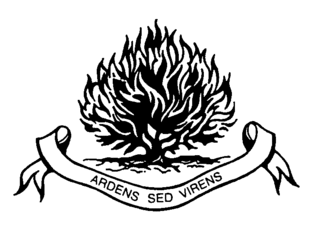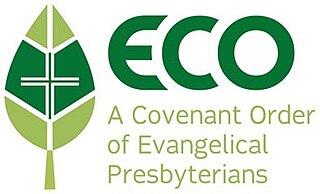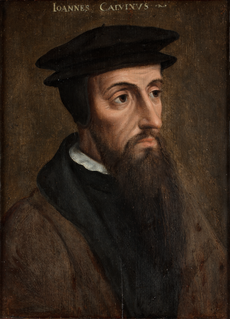Related Research Articles

Presbyterianism is a part of the Reformed tradition within Protestantism that traces its origin to the Church of Scotland. Presbyterian churches derive their name from the presbyterian form of church government by representative assemblies of elders. Many Reformed churches are organised this way, but the word Presbyterian, when capitalized, is often applied to churches that trace their roots to the Church of Scotland or to English Dissenter groups that formed during the English Civil War.

The Presbyterian Church (USA), abbreviated PC(USA), is a mainline Protestant denomination in the United States. It is the largest Presbyterian denomination in the US, and known for its liberal stance on doctrine and its ordaining of women and members of the LGBT community as elders and ministers. The PC(USA) was established by the 1983 merger of the Presbyterian Church in the United States, whose churches were located in the Southern and border states, with the United Presbyterian Church in the United States of America, whose congregations could be found in every state. The similarly named Presbyterian Church in America is a separate denomination whose congregations can also trace their history to the various schisms and mergers of Presbyterian churches in the United States. Unlike the PCA, the PC(USA) supports evangelical feminism and supports practise of same gender marriages. It also welcomes practicing gay and lesbian persons to serve in leadership positions as ministers, deacons, elders, and trustees.
Presbyterianpolity is a method of church governance typified by the rule of assemblies of presbyters, or elders. Each local church is governed by a body of elected elders usually called the session or consistory, though other terms, such as church board, may apply. Groups of local churches are governed by a higher assembly of elders known as the presbytery or classis; presbyteries can be grouped into a synod, and presbyteries and synods nationwide often join together in a general assembly. Responsibility for conduct of church services is reserved to an ordained minister or pastor known as a teaching elder, or a minister of the word and sacrament.

The Presbyterian Church in America (PCA) is the second-largest Presbyterian church body, behind the Presbyterian Church (USA), and the largest conservative Calvinist denomination in the United States. The PCA is Reformed in theology and presbyterian in government. It is characterized by a blend of Calvinist practice and broad evangelicalism.

The Cumberland Presbyterian Church is a Presbyterian denomination spawned by the Second Great Awakening. In 2019, it had 65,087 members and 673 congregations, of which 51 were located outside of the United States. The word Cumberland comes from the Cumberland River valley where the church was founded.

Montserrado County is a county in the northwestern portion of the West African nation of Liberia containing its national capital, Monrovia. One of 15 counties that comprise the first-level of administrative division in the nation, it has 17 sub political districts. As of the 2008 Census, it had a population of 1,118,241, making it the most populous county in Liberia. The area of the county measures 1,912.7 square kilometres (738.5 sq mi), the smallest in the country. Bensonville serves as the capital.

The Presbyterian Church in Canada is a Presbyterian denomination, serving in Canada under this name since 1875. The United Church of Canada claimed the right to the name from 1925 to 1939. According to the Canada 2001 Census 409,830 Canadians identify themselves as Presbyterian, that is, 1.4 percent of the population.

The Presbyterian Church in the United States of America (PCUSA) was the first national Presbyterian denomination in the United States, existing from 1789 to 1958. In that year, the PCUSA merged with the United Presbyterian Church of North America, a denomination with roots in the Seceder and Covenanter traditions of Presbyterianism. The new church was named the United Presbyterian Church in the United States of America. It was a predecessor to the contemporary Presbyterian Church (USA).
The Upper Cumberland Presbyterian Church is a Christian denomination in the United States with fewer than 1,000 members among twelve Wiktionary:congregations in Alabama and Tennessee.

Louisa Mariah Layman Woosley was the first woman ordained as a minister in any Presbyterian denomination. She was ordained by the Cumberland Presbyterian Church on November 5, 1889.
The Cumberland Presbyterian Church in America is a historically African-American denomination which developed from the Cumberland Presbyterian Church in 1874.
The Presbyterian Church of India (PCI) is a mainline Protestant church based in India, with over one million adherents, mostly in Northeast India. It is one of the largest Christian denominations in that region.

The Reformed Presbyterian Church of North America (RPCNA) is a Presbyterian church with congregations and missions throughout the United States, Canada, Japan, and Chile. Its beliefs—held in common with other members of the Reformed Presbyterian Global Alliance—place it in the conservative wing of the Reformed family of Protestant churches. Below the Bible—which is held as divinely inspired and without error—the church is committed to several "subordinate standards," together considered with its constitution: the Westminster Confession of Faith and Larger and Shorter Catechisms, along with its Testimony, Directory for Church Government, the Book of Discipline, and Directory for Worship.

The Reformed Presbyterian Church of Scotland is a small, Scottish, Presbyterian church denomination. Theologically they are similar to many other Presbyterian denominations in that their office-bearers subscribe to the Westminster Confession of Faith. In practice, they are more theologically conservative than most Scottish Presbyterians and maintain a very traditional form of worship. In 1690, after the Revolution, Alexander Shields joined the Church of Scotland, and was received along with two other ministers. These had previously ministered to a group of dissenters of the United Societies at a time when unlicensed meetings were outlawed. Unlike these ministers, some Presbyterians did not join the reconstituted Church of Scotland. From these roots the Reformed Presbyterian Church of Scotland was formed. It grew until there were congregations in several countries. In 1876 the majority of Reformed Presbyterians, or RPs, joined the Free Church of Scotland, and thus the present-day church, which remained outside this union, is a continuing church. There are currently Scottish RP congregations in Airdrie, Stranraer, Stornoway, Glasgow, and North Edinburgh. Internationally they form part of the Reformed Presbyterian Communion.

ECO: A Covenant Order of Evangelical Presbyterians is an evangelical Presbyterian denomination in the United States. As a Presbyterian church, ECO adheres to Reformed theology and Presbyterian polity. It was established in 2012 by former congregations and members of the Presbyterian Church (USA), abbreviated PC(USA). Denominational disputes over theology—particularly ordination of practicing homosexuals as pastors and gay marriage—and bureaucracy led to the founding of ECO. In 2018, ECO has over 383 congregations, 103,425 covenant partners and over 500 pastors. ECO churches are egalitarian in beliefs and ordain women as pastors and elders.

The National Presbyterian Church in Mexico is the second-largest Protestant church, and the largest Reformed denomination in Mexico. It is present throughout the country, and is particularly strong in the states of Tabasco, Chiapas, Campeche, Yucatan, Nuevo León, Aguascalientes and Mexico City.
The Africa Evangelical Presbyterian Church (AEPC) is a growing conservative Presbyterian and Reformed Church which adheres to the Westminster Confession of Faith started in Kenya, later spread to the surrounding countries like Burundi, Tanzania, Congo and as far as Zimbabwe. The headquarters of the church is located in Nairobi, Kenya. The current Moderator is Rev. Dr Joseph Mutei installed on Sunday 26th June 2022
The Presbyterian Church of Africa was founded in 1898 by Rev. James Mzimba, who broke from the Church of Scotland. He was born in Ngquakai, and his father was a deacon in the Presbyterian Church. Mzimba become a pastor, and was ordained in 1875. He was sent to Scotland to the anniversary of the Free Church of Scotland, but later severed its ties with the denomination. In 1899 he founded his own independent Presbyterian church. He died in 1911. The first Synod was constituted in Alice, Cape Colony. Mzimba had a dispute with the Free Church of Scotland over land and over the use of money. The Presbyterian Church of Africa is a predominantly black church. It was a small group of churches with 2 presbyteries. The church grew steadily. It is one of the oldest independent churches in Africa.

Presbyterianism has had a presence in the United States since colonial times and has exerted an important influence over broader American religion and culture.
References
- ↑ Benedetto, Robert; McKim, Donald K. (2009-10-06). Historical Dictionary of the Reformed Churches. ISBN 9780810870239.
- 1 2 "Adressdatenbank reformierter Kirchen und Einrichtungen".
- ↑ "Presbyterian Church of Liberia".
- ↑ Gordon Melton, J.; Baumann, Martin (2010-09-21). Religions of the World: A Comprehensive Encyclopedia of Beliefs and ... - Google Books. ISBN 9781598842043 . Retrieved 2022-09-14.
- 1 2 "Our Congregations - Presbyterian Church of Liberia".
- ↑ www.wcrc.ch/node/164 Archived 2012-08-08 at the Wayback Machine
- ↑ "The World Reformed Fellowship - Membership List". Archived from the original on 2012-07-30. Retrieved 2013-02-17.